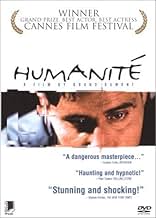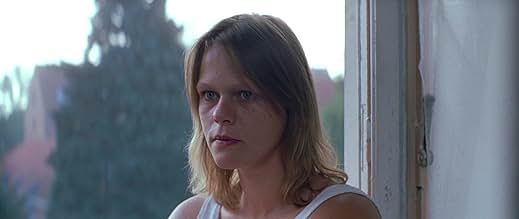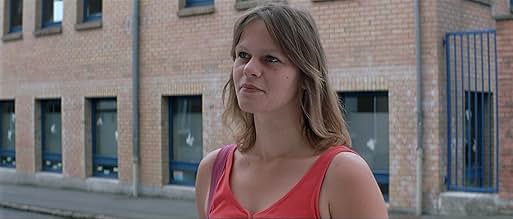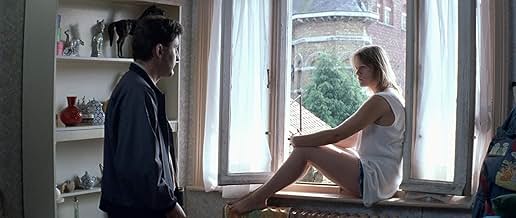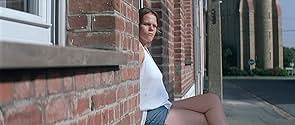CALIFICACIÓN DE IMDb
6.8/10
5.3 k
TU CALIFICACIÓN
Cuando una niña de 11 años es brutalmente violada y asesinada en un tranquilo pueblo francés, un detective de la policía investiga el crimen que resulta tener más preguntas que respuestas.Cuando una niña de 11 años es brutalmente violada y asesinada en un tranquilo pueblo francés, un detective de la policía investiga el crimen que resulta tener más preguntas que respuestas.Cuando una niña de 11 años es brutalmente violada y asesinada en un tranquilo pueblo francés, un detective de la policía investiga el crimen que resulta tener más preguntas que respuestas.
- Premios
- 3 premios ganados y 3 nominaciones en total
Darius
- L'infirmier
- (as Daniel Leroux)
Robert Bunzi
- Le policier anglais
- (as Robert Bunzl)
- Dirección
- Guionista
- Todo el elenco y el equipo
- Producción, taquilla y más en IMDbPro
Opiniones destacadas
The French writer-director Bruno Dumont achieves something rarely accomplished since TAXI DRIVER and ERASERHEAD: a way of looking at the world entirely afresh. Unlike those movies--or the recent, Expressionist CLEAN, SHAVEN--Dumont doesn't distort the physical world, make it elastic or dreamlike. But he somehow makes us feel the world is being recorded by a very wise child from another planet. Everything, absolutely everything, from human behavior to wind rippling over a field of grass, is seen as never before. Ezra Pound's injunction to "make it new" is stamped on every frame.
Pharaon is a slow-witted police superintendent who is anything but pharaonic. He had a girlfriend and a baby, now dead. (We are not told how.) He is friends with Domino, a big-boned, sensitive, slatternly woman next door, and Joseph, her handsome beau, with whom she seems to never stop having sex. In their small town, a little girl has been raped and murdered. Pharaon pursues this case, as he pursues a sort of inarticulate love for Domino. Along the way, a light dawns in Pharaon--a dreadful light. He becomes sensitive to the suffering of all living things--a pig hurt by the suckling of her young, all the way to a motorist getting a beating outside police headquarters. The effect this has is to create a kind of moral schizophrenia in Pharaon: he can filter out nothing. Like an overlap of Raskolnikov and Prince Mishkin, Pharaon takes both the world's sin and sufferings on his back.
But this gives only the barest outline of the experience of L'HUMANITE, which is not about its plot. Indeed, the relationship of Dumont's handling of the materials of cinema to the story itself is unique in my experience of narrative moviemaking. Like Abbas Kiarostami in his recent work, Dumont uses the landscape not to illustrate the story, but to propose a dialectic against it. Where the landscape acts as an argument for life in Kiarostami's TASTE OF CHERRY, here it does something else. It vibrates with feeling. In its childlike gaze at the hardness of people and things, L'HUMANITE tries to get at the shifting feelings underneath--the emotions and sensations so elusive there are no words for them. The movie proves that literary means--finding names--are unnecessary. Dumont finds aural-visual-rhythmic means to voice those emotions.
His techniques can be daring, appalling. Pharaon, gradually overwhelmed by the world's thousand and one cruelties, starts to spontaneously embrace (relative) total strangers, in scenes one can imagine giving audiences giggles. Dumont doesn't care.
L'HUMANITE is the kind of movie that, while you're watching it, you feel can drive you crazy in places, but which you know you'll live with and re-play in your head for the rest of your life. And Cannes naysayers to the contrary, all the performances in this movie--all of them, down to the tiniest--are perfect.
A note: I would like to thank the other people who wrote about L'HUMANITE on IMDB. With no other movie have I felt I learned so much by reading other people's responses, and particularly noting the details they chose to underline. For the authenticity and unabashedness of everyone's responses, I am truly grateful.
Pharaon is a slow-witted police superintendent who is anything but pharaonic. He had a girlfriend and a baby, now dead. (We are not told how.) He is friends with Domino, a big-boned, sensitive, slatternly woman next door, and Joseph, her handsome beau, with whom she seems to never stop having sex. In their small town, a little girl has been raped and murdered. Pharaon pursues this case, as he pursues a sort of inarticulate love for Domino. Along the way, a light dawns in Pharaon--a dreadful light. He becomes sensitive to the suffering of all living things--a pig hurt by the suckling of her young, all the way to a motorist getting a beating outside police headquarters. The effect this has is to create a kind of moral schizophrenia in Pharaon: he can filter out nothing. Like an overlap of Raskolnikov and Prince Mishkin, Pharaon takes both the world's sin and sufferings on his back.
But this gives only the barest outline of the experience of L'HUMANITE, which is not about its plot. Indeed, the relationship of Dumont's handling of the materials of cinema to the story itself is unique in my experience of narrative moviemaking. Like Abbas Kiarostami in his recent work, Dumont uses the landscape not to illustrate the story, but to propose a dialectic against it. Where the landscape acts as an argument for life in Kiarostami's TASTE OF CHERRY, here it does something else. It vibrates with feeling. In its childlike gaze at the hardness of people and things, L'HUMANITE tries to get at the shifting feelings underneath--the emotions and sensations so elusive there are no words for them. The movie proves that literary means--finding names--are unnecessary. Dumont finds aural-visual-rhythmic means to voice those emotions.
His techniques can be daring, appalling. Pharaon, gradually overwhelmed by the world's thousand and one cruelties, starts to spontaneously embrace (relative) total strangers, in scenes one can imagine giving audiences giggles. Dumont doesn't care.
L'HUMANITE is the kind of movie that, while you're watching it, you feel can drive you crazy in places, but which you know you'll live with and re-play in your head for the rest of your life. And Cannes naysayers to the contrary, all the performances in this movie--all of them, down to the tiniest--are perfect.
A note: I would like to thank the other people who wrote about L'HUMANITE on IMDB. With no other movie have I felt I learned so much by reading other people's responses, and particularly noting the details they chose to underline. For the authenticity and unabashedness of everyone's responses, I am truly grateful.
After seeing L'Humanite at the Edinburgh festival, it's difficult to imagine it winning the Cannes Grand Jury Prize as well as the best actor and actress awards. The film is an unquestionably beautiful but otherwise unremarkable example of French cinema. Call me a stuffy American, but I found the opening sequence of the rape victim's damaged body to be completely unnecessary. The film's title is the most pretentious in recent memory.
What's this about quiet small towns that so capture the curiosity and imagination of film-makers. Here we have another study by the director of the Life of Jesus (which incidentally is about a small town too)which shows, from the surface, how a Police Superintendant copes with the brutal rape and murder of a young girl. With this as a background, the film proceeds to show the aimlessness in the protanganist's life and his relationships with the people around him.
While the pace of the film is slow, you do get a feeling that such an approach is necessary. As such, you get many long shots. You also get shots that are very upfront and will no doubt make many in the audience feel uneasy.
There will be many different comments about the show. I heard some French guys coming out of the cinema and lauding it as "Pure Cinema" while others have complained that it was pretentious. For me, I thought it was boring.
While the pace of the film is slow, you do get a feeling that such an approach is necessary. As such, you get many long shots. You also get shots that are very upfront and will no doubt make many in the audience feel uneasy.
There will be many different comments about the show. I heard some French guys coming out of the cinema and lauding it as "Pure Cinema" while others have complained that it was pretentious. For me, I thought it was boring.
It is said that Humanite is not for everyone. And i would surely support that claim since I am a steward in the Tel Aviv Cinematheque and had to get up, about every two minutes to open the door to someone sneaker.
Still, I managed to get quite a clear impression of the film which is in my opinion a superb one. Although many people find themselves puzzled by the characters (virtually everyone in the show i attended came out of the cinema looking almost personally insulted by the film) i think that if you know and love Dostoevsky's books you won't find them so hard to understand. Pharaon is simply Prince Mishkin. He is assulted by the bluntness and cruelness of existence and the crime he tries to solve - but is overwhelmed with humility, love and compassion to the world. While his friend make love in a way that seems almost like a rape he makes love to the world, to the clods of the earth. When he rides his bicycle his upper body seems to be moving as if he was making love. But most of all he feels diligent compassion to the world and it's assaulters. The film shows the violence everywhere. Pharaon sees this violence and with his deep gaze manages to disarm it (with protesters and with Domino). I think that Pharaon is a really great acting performance. Pharaon like Mishkin in Dostoevky's notebooks 'sees not in the faces of people but in their hearts.'. The investigation taking place is like an investigation of the inner self. Of the human soul, of humanity. It's a category against Humanity and Pharaon's who is the categor manages to find compassion to humanity. Its sort of like an 'apocalypse now' in rural france.
Still, I managed to get quite a clear impression of the film which is in my opinion a superb one. Although many people find themselves puzzled by the characters (virtually everyone in the show i attended came out of the cinema looking almost personally insulted by the film) i think that if you know and love Dostoevsky's books you won't find them so hard to understand. Pharaon is simply Prince Mishkin. He is assulted by the bluntness and cruelness of existence and the crime he tries to solve - but is overwhelmed with humility, love and compassion to the world. While his friend make love in a way that seems almost like a rape he makes love to the world, to the clods of the earth. When he rides his bicycle his upper body seems to be moving as if he was making love. But most of all he feels diligent compassion to the world and it's assaulters. The film shows the violence everywhere. Pharaon sees this violence and with his deep gaze manages to disarm it (with protesters and with Domino). I think that Pharaon is a really great acting performance. Pharaon like Mishkin in Dostoevky's notebooks 'sees not in the faces of people but in their hearts.'. The investigation taking place is like an investigation of the inner self. Of the human soul, of humanity. It's a category against Humanity and Pharaon's who is the categor manages to find compassion to humanity. Its sort of like an 'apocalypse now' in rural france.
In this case, largely one man's reality, although several others are involved. I hesitate to make literary comparisons, because film is a visual medium with its own immediacy, but the central characters of the novels by Emmanuel Bove and Patrick Susskind ("The Pigeon" in particular) put me very much in mind of Pharaon de Winter, the "hero" of this film and is one reason I love it. The inwardness,the soulful need that is barely understood by the man himself, the sometimes interminably slow pace bring a profound melancholic tone that I have rarely experienced on the screen.
I agree with others who've posted here, this isn't a film for everyone. But if you are moved by the deep existential reflection and quiet, sensitive behavior of a person who can empathize out of his/her own pain, I would recommend this movie.
I agree with others who've posted here, this isn't a film for everyone. But if you are moved by the deep existential reflection and quiet, sensitive behavior of a person who can empathize out of his/her own pain, I would recommend this movie.
¿Sabías que…?
- TriviaThe body of the raped little girl was a silicone cast.
- Citas
[first lines]
l'inspecteur de police Pharaon De Winter: I'm coming.
- Versiones alternativasItalian distributor BIM originally removed about 2 minutes of sex footage from the Italian theatrical release in order to avoid a 'not under 18' rating. When the press criticized this self-censorship attempt, the distributor reissued the film in its original, integral form.
- Bandas sonorasLe Vertigo, Rondeau. Modérément
from "Pièce de Clavecin"
Music by Pancrace Royer
Performed by William Christie
Courtesy of harmonia mundi
Selecciones populares
Inicia sesión para calificar y agrega a la lista de videos para obtener recomendaciones personalizadas
- How long is Humanité?Con tecnología de Alexa
Detalles
- Fecha de lanzamiento
- País de origen
- Sitios oficiales
- Idiomas
- También se conoce como
- Humanity
- Locaciones de filmación
- Bailleul, Nord, Francia(Village)
- Productoras
- Ver más créditos de la compañía en IMDbPro
Taquilla
- Total en EE. UU. y Canadá
- USD 113,495
- Fin de semana de estreno en EE. UU. y Canadá
- USD 10,075
- 18 jun 2000
- Tiempo de ejecución2 horas 21 minutos
- Color
- Mezcla de sonido
- Relación de aspecto
- 2.35 : 1
Contribuir a esta página
Sugiere una edición o agrega el contenido que falta

Principales brechas de datos
What is the Spanish language plot outline for L'humanité (1999)?
Responda
